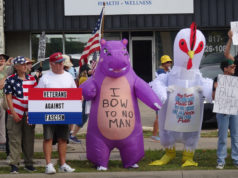Journalists around the world are watching North Korea these days to see what is in store in that repressive country for two young journalists, Euna Lee and Laura Ling, who were recently sentenced to 12 years in a labor prison for allegedly entering the country illegally and for unspecified “hostile acts” against the Korean nation.
Very few facts are known about how the two journalists, who work for Current TV, got into this predicament. They had gone to the region to work on a story about North Korean refugees along the Chinese border. They told their families and friends before they left that they were not intending to cross the border. Current TV, owned by Al Gore, is saying very little.
The uproar over their arrest, brief trial, and heavy sentences, has been muted by concerns that loud expressions of outrage might backfire and that the two women might become pawns (if they are not already) in the incredibly high-stakes/high-testosterone game being played by North Korea’s dictator, with his long-range missile firings and nuclear bomb tests.
At this point, behind-the-scenes negotiating is almost certainly going on, and we can only hope that the result will be freedom for the pair or a substantially lessening of their sentences. In the meantime, their families are backing an effort on Facebook to organize support for Lee and Ling. The Committee to Project Journalists — a great organization — has enlisted 40 media rights organizations to sign a letter calling on the international community to work for the two journalists’ release.
North Korea is about as far from North Texas as you can get without slipping the surly bonds of Earth. But every day, in countries around the globe, journalists are putting their lives on the line to bring people news they urgently need. The Weekly’s Peter Gorman has done it, in his groundbreaking coverage of the drug wars along the Texas-Mexico border. Freelance writer Don Jones did it, when he went to Iraq as an embedded reporter for this paper a couple of years ago. And our sources do a version of it all the time, putting their jobs, if not their lives, on the line to get important news out to the public.
In this country, bullying of the press is usually confined to shutting us out of meetings, refusing to return phone calls, charging exorbitant prices for records, threatening to sue, or putting reporters in relatively civilized jails when they refuse to answer questions that would put their sources at risk. Sometimes it goes beyond that, though. Oakland Post editor Chauncey Bailey was gunned down in California in 2007 for doing his job. And from here, one need look no farther than the country just across Texas’ southern border to understand the courage it takes to be a reporter in some parts of the world. In Mexico, according the Committee to Protect Journalists, “untouchable drug cartels have made reporting on crime in Mexico the most dangerous beat in the Americas.”
If you’re into candles, you might light one tonight for Lee and Ling, for Roxana Saberi, recently released from Iran, for the spirit of Daniel Pearl, for all the courageous journalists now working in Somalia, where five journalists have been killed this year and at least two freelancers have been held captive since August. And think about who will do the kind of work they have done, if the lights go out in the offices of newspapers and news magazines and news programs. And who wins, in that case.










